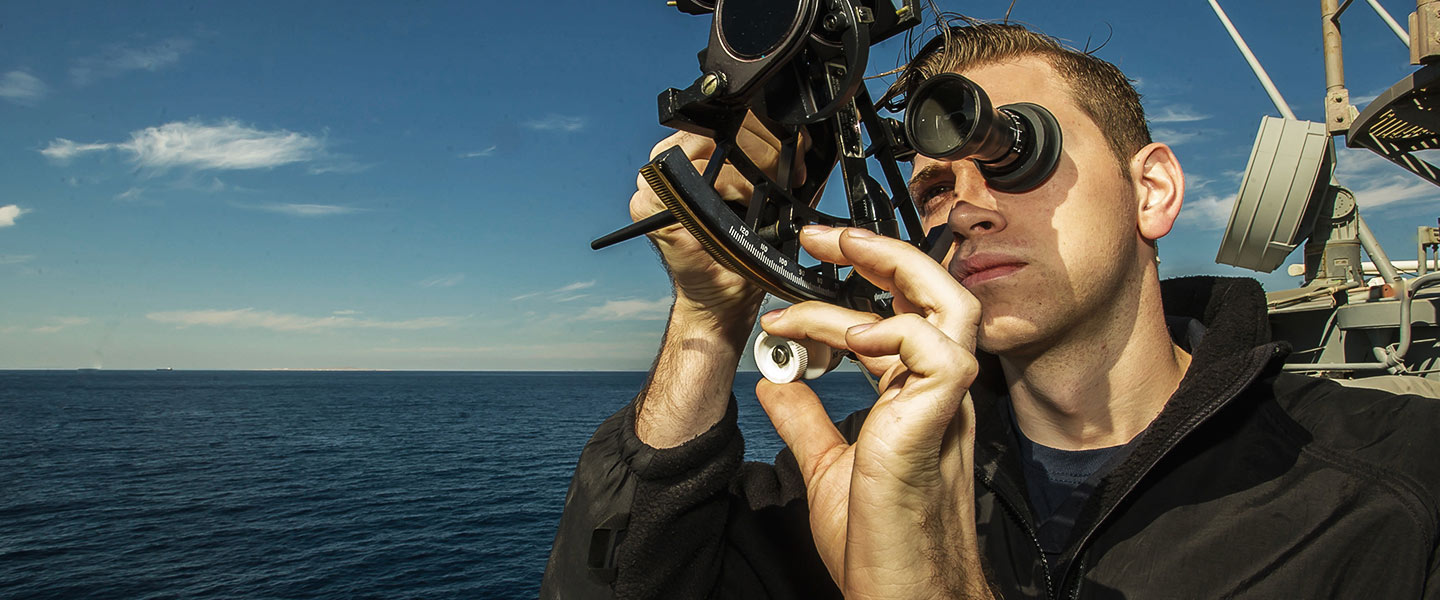What to Expect
More Information
Responsibilities
Quartermasters (QM) stand watch as assistants to Officers of the deck and navigators. They serve as helmsman and perform ship control, navigation and bridge watch duties. Your duties may include:
- Procure, correct, use and stow navigational and oceanographic publications and oceanographic charts
- Maintain navigational instruments
- Keep correct navigational time
- Render “Honors and Ceremonies” in accordance with national observance and foreign custom
- Send and receive visual messages
- Serve as petty officers in charge of tugboats, self-propelled barges and other yard craft and district craft
Work Environment
Quartermasters can expect to work in a clean, air-conditioned electronic equipment space or the ship’s bridge/pilot house. They frequently perform their work as part of a team, but may work on individual projects. Their work generally involves mental analysis and problem solving.
Training & Advancement
Upon completion of initial training at Recruit Training Command Great Lakes (known as Boot Camp), you’ll report for specialized training, including:
Class “A” Technical School (9 weeks) in Great Lakes, IL, for training in fundamentals of Navigation and Oceanography.
After you’ve completed training, you may be assigned to all types of ships in the United States and overseas. As a QM, you can expect approximately 60% of your assignments to take place at sea.
Promotion opportunities are regularly available but competitive and based on performance.
Advanced Training
Advanced training as a Quartermaster may also be available during later stages of your career. For those with further leadership aspirations and a college degree, Officer roles may be available, providing opportunities to lead and train others.
Post-Service Opportunities
Specialized training received and work experience gained in the course of service can lead to valuable credentialing and occupational opportunities in related fields in the civilian sector.
Education Opportunities
Beyond offering access to professional credentials and certifications, Navy technical and operational training in the field of intelligence can translate to credit hours toward a bachelor’s or associate degree through the American Council on Education.
You may also continue your education through undergraduate degree opportunities like the Navy College Program and Tuition Assistance and the Post-9/11 GI Bill.
Qualifications & Requirements
A high school diploma or equivalent is required to become an Enlisted Sailor in the Navy. Those seeking a Quartermaster position must be U.S. citizens who can meet all security clearance requirements. Normal hearing and color perception are also required.
You should have a good working knowledge of arithmetic and some physical strength and good manual dexterity. The capability for understanding modern computing devices and the ability to speak and write well and function as a member of an integrated team, do detailed work and keep accurate records are also important.
General qualifications may vary depending upon whether you’re currently serving, whether you’ve served before or whether you’ve never served before.
Part-Time Opportunities
There are part-time opportunities available as a Quartermaster.
Serving part-time as a Navy Reserve Sailor, your duties will be carried out during your scheduled drilling and training periods. During monthly drilling, Quartermasters in the Navy Reserve typically work at a location close to their homes.
For annual training, Quartermasters may serve anywhere in the world, whether on a ship at sea or at bases and installations on shore.
Take a moment to learn more about the general roles and responsibilities of Navy Reserve Sailors.
Most of what you do in the Navy Reserve is considered training. The basic Navy Reserve commitment involves training a minimum of one weekend a month (referred to as drilling) and two weeks a year (referred to as Annual Training) – or the equivalent of that.
Quartermasters in the Navy Reserve serve in an Enlisted role. Before receiving the ongoing professional training that comes with the job, initial training requirements must be met.
For current or former military Enlisted servicemembers, prior experience satisfies the initial Recruit Training requirement, so you will not need to go through Boot Camp again.
For those without prior military experience, you will need to meet the initial Recruit Training requirement by attending Boot Camp in Great Lakes, IL. This training course will prepare you for service in the Navy Reserve and count as your first Annual Training.

































































































































